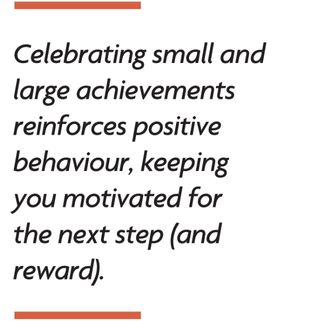You’ve probably heard this before: “What’s your five-year plan” or “where do you see yourself in this company?” These questions have followed us from our after-school job folding jeans at the mall to our trembling and awkward college internship interviews and almost every career move since. These questions are actually about your goals. Do you have them? What are you doing to achieve them?
Setting goals may feel like an arduous, eye-rolling task, but without them we risk wandering through life without focus or direction. Whether it’s related to your career, health, finances or saving for a home, learning how to set achievable goals provides us with more control over how we spend our days, nights or weekends.
Yet, as meaningful as it sounds, many of us struggle to achieve the goals we set for ourselves. It takes planning, thought and reflection, so if this seems like a lot of work — and that you have to set a goal to set a goal — we’ve got you covered. Here are some tips to help you move from good intentions to achievement.
Be Specific and Action-Oriented
Details are a game-changer in goal setting. Vague or loosely defined goals can lead to frustration, burnout and loss of focus. Quantifying your goals — for example, “hit the gym three times a week for the next three months” instead of “be healthier” — makes it easier to measure progress and stay accountable. Goals should also be actionable and tell you the next step to take by using language that prompts immediate behaviour, like “create,” “launch,” “complete” or “improve.” Let’s say you want to create more of a social media presence for your business. A specific and
action-oriented goal could start with “launch a new Instagram account with 20 curated posts by September 1.” That next-step clarity provides a specific goal with an achievable deadline.
Set Goals That Fit Your Life
Don’t set goals that you actually hate. It’s important to align your goals with your current life circumstances. A goal that’s ambitious but unrealistic for your time, resources or stage of life can quickly become overwhelming. Choosing relevant and achievable objectives, along with realistic deadlines, will provide clarity and create a sense of urgency that drives action. For example, a working mother and master’s student swapped her broad goal of “finish my thesis this semester” with a more actionable “write 500 words every Saturday during the kids’ soccer practice.” This new goal is more realistic and time-specific while still respecting her bandwidth.
 Break It Down
Break It Down
Instead of tackling one giant goal, break it down into smaller, bite-sized chunks. Hitting mini-goals builds momentum as it has a snowball effect — progress fuels motivation, which drives more progress. If you or your business or organization has multiple objectives, dividing them into doable tasks makes everything feel more manageable. For big, intimidating goals, think snack-sized bites. They’re less overwhelming and more achievable, so you’ll see results sooner — which will keep you going.
The Power of Milestones
Milestones are essential when it comes to turning dreams into reality. They serve as checkpoints, helping you track progress and stay motivated along the way. Whether you’re training for a marathon, launching a side hustle or writing an article (like this one), setting milestones maintains momentum and focus. For example, you decided to run your first half-marathon and set distance goals to complete for each week. Hitting those milestones will give you the confidence that you are on track.
Evaluate Regularly
Review and evaluate your progress as you go. In life, when circumstances change so must your goals, which is why they require regular check-ins. Reviewing your goals shows what’s working, what needs tweaking and helps ensure you’re moving in the right direction.
 Celebrate Your Wins
Celebrate Your Wins
Sure, achieving your goal is the reward itself, of course. But you also deserve a little treat. Celebrating small and large achievements reinforces positive behaviour, keeping you motivated for the next step (and reward). After completing a demanding certification exam, book a weekend getaway, go out for an amazing dinner or buy yourself a little special something. Celebrating your achievements can keep the momentum alive and make the journey more enjoyable.
Set Timelines
Determine the duration of your goal by estimating the time you need to achieve it. You could set goals weekly, monthly or in 12-week/three-month intervals. It’s also helpful to define specific hours per week/day or allocate which days you will work on your goal when you have spare time or alone time (eg. Sunday mornings, Wednesday evenings). For those unexpected turns of events, it can also be helpful to give yourself a small time buffer by increasing your estimated deadline.
Be Flexible
There’s a plot twist when goal setting: you don’t have to hit it perfectly. In pursuit of your goal, sometimes you grow, learn new insights or spark ideas that lead to something better than you planned. And sometimes life happens and you need to readjust. Don’t dwell on it or beat yourself up over missteps. Ups and downs are part of the process. We recalibrate, readjust and keep going.
Whether you’re crushing goals or just trying to remember where you wrote them down, the key is to keep going. Progress over perfection.
When you started reading this article, you unknowingly set a goal to finish it. I have good news: mission accomplished. Even better news? You’ve earned yourself a little reward.
Let’s set some goals, shall we?



















 Break It Down
Break It Down Celebrate Your Wins
Celebrate Your Wins





